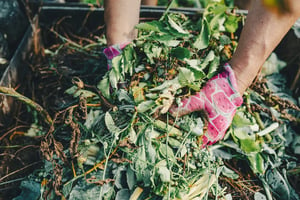
Sector Groups
About our Sector Groups
The sector groups' strategic plans and work programmes, meeting minutes and committee membership details can all be found in our member portal. If you are a member and need help signing into the member portal, or are unsure of your membership status, please contact us.

Established to share knowledge and resources to develop and encourage the implementation of behaviour change good practice.

Promoting good practice through clear and concise legislation, stakeholder relationships, and knowledge sharing.
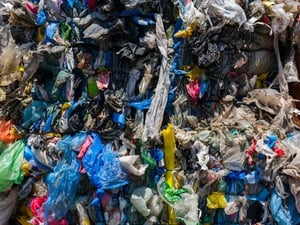
Promoting safe and sustainable disposal facilities through industry collaboration, stakeholder relationships and increasing knowledge.
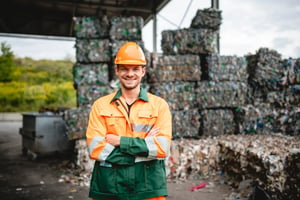
Established to eliminate occupational injury or illness in the solid waste, resource recovery and contaminated land management sectors

This sector group works to minimise the generation of residual organic materials, and to maximise the value of residual organic materials, ensuring their beneficial reuse.

When producers, brand owners, importers, retailers and consumers accept responsibility for reducing a product’s environmental impact.

The aim of this sector group is to give a stronger voice to the recycling and resource recovery sector.
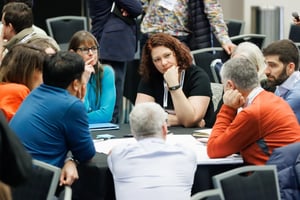
Creating consistency and efficiency of service amongst territorial authorities through sharing knowledge and best practice around waste, recycling and resource recovery.

Join WasteMINZ today!
Join WasteMINZ today!
Sector Group Resources
Here are our publicly available resources. To get access to all our resources, you will need to sign into the portal. If you are not a member, become a member today!
Waste Industry Guidelines for the Disposal of low-level asbestos-contaminated soil at a landfill 2024
These guidelines relate specifically to the transport, receipt, and disposal of soils that a suitably qualified and experienced practitioner (SQEP) or competent person has determined does not contain asbestos-containing material (ACM) or friable asbestos in a quantity that is likely to lead to airborne contamination at a level that exceeds trace levels.
Reclaiming Resources - Optimising soil reuse in infrastructure and development
The purpose of this white paper is to summarise the discussion and findings from a WasteMINZ workshop held in May 2024 entitled ‘Can you dig it? The problem with the reuse of soils’.
Briefing to the Minister 2023
A briefing document to incoming Minister for the Environment Penny Simmonds outlining the waste sector's issue and WasteMINZ's priorities
Soil disposal key points 2023
A document outlining key points about the issues surrounding soil disposal in developments 2023
Connect the dots: compostable packaging stewardship scheme
Results from independent research to design a product stewardship scheme for compostable plastics.
Rethinking Rubbish and Recycling - Plastic Report
A report into plastics in recycling in New Zealand
The truth about plastic recycling in New Zealand
A summarised report about plastic recycling in NZ, with recommendations from WasteMINZ
Rethinking Rubbish and Recycling - research report
The findings of research into consumer behaviours towards recycling
Love Food Hate Waste pilot intervention project 2022
Findings from a pilot intervention project aiming to measure effectiveness of different food waste messages on reducing food waste
National Waste Data Framework Combined Protocols 2015
A document outlining two volumes of definitions and protocols for gathering and presenting information within a National Waste Data Framework
Local Government Waste Management Manifesto 2020
A document outlining the waste-related priorities of the local government waste officers in 2020
Annual Report 2018-19
Operational and financial reporting for the period 1 July 2018 - 30 June 2019
Annual Report 2019-20
Operational and financial reporting for the period 1 July 2019 - 30 June 2020
Annual Report 2020-21
Operational and financial reporting for the period 1 July 2020 - 30 June 2021
Annual Report 2021-22
Operational and financial reporting for the period 1 July 2021 - 30 June 2022
Annual Report 2022-23
Operational and financial reporting for the period 1 July 2022 - 30 June 2023
Annual Report 2023-24
Operational and financial reporting for the period 1 July 2023 - 30 June 2024
WasteMINZ Code of Conduct
WasteMINZ Code of Conduct that all WasteMINZ members are expected to adhere to.
Conference sponsorship & exhibition options 2024
A document outlining the sponsorship and exhibition opportunities for 2024
Guidelines on the advertising of fibre and biomass based compostable products and packaging
Guidelines on the advertising of fibre and biomass based compostable products and packaging
LANDSCAPE Bilingual te reo Māori-English Recycling Symbols
A folder of landscape bilingual te reo Māori recycling symbols
PORTRAIT Bilingual te reo Māori-English Recycling Symbols
A folder of portrait bilingual te reo Māori recycling symbols
Guidelines on claims about recyclability, recycled content, reusability and repairability
Guidelines on claims about recyclability, recycled content, reusability and repairability
Consent Guide for Composting Operations in New Zealand 2009
Consent Guide for Composting Operations in New Zealand 2009
Guidance for creating signage at zero waste events
Guidance for creating signage at zero waste events
Para Kore Zero Waste Glossary
A glossary of appropriate te reo Māori kupu (words) in the waste and resource recovery space
Recycling Bin Suppliers
This document provides details of suppliers of indoor and outdoor recycling bins and accessories.
Standard colours for recycling & rubbish bins
Outlining standard colours for rubbish & recycling bins
NZ Waste strategy
The Ministry for Environment announced changes to kerbside collections and the introduction of the New Zealand Waste Strategy in March 2023
Climate Change Commission’s draft advice on the second emissions reduction plan
The content on this page is the web version of the Climate Change Commission's 2023 Draft advice to Government to inform the strategic direction of its second emissions reduction plan.
Minimising lead exposure - position paper 2023
A position paper from the WasteMINZ residential lead working group on Minimising lead exposure in the NZ residential environment
TAO Forum - Local Government Waste Management Manifesto 2023
TAO Forum's Local Government Waste Management Manifesto articulates actions that would make a difference to territorial authorities’ ability to effectively manage and minimise waste.
TAO Forum - position paper on Container Return Schemes 2023
A position paper from the TAO Forum about the government's decision to put a CRS on hold in 2023
Factsheet - Planning earthworks, subdivision, a change of land use, to apply for resource consent
If you're planning earthworks, subdivision, or a change of land use, this fact sheet will help you to determine whether your property may be contaminated.
Fact sheet - Selling or buying a property that may be contaminated
This factsheet gives potential buyers or sellers advice on what to disclose when selling and how to find out about potential contamination in before buying a property
Fact sheet - Are you about to subdivide or change the land use of a potentially contaminated property?
This factsheet gives property owners an overview of their responsibilities when change land use or subdividing
Fact sheet - Are you carrying out earthworks on a potentially contaminated property?
This factsheet gives property owners an overview of their responsibilities when carrying out earthworks on a potentially contaminated property.
Position paper on municipal waste-to-energy plants 2022
A position paper from the WasteMINZ Behvaiour Change sector group about waste-to-energy plants that incinerate municipal waste.
How do I find a SQEP?
A factsheet explaining how to find a Suitably Qualified and Experienced Practitioner (SQEP)
Why do I need a SQEP?
A factsheet explaining why it is important to use a Suitably Qualified and Experienced Practitioner (SQEP) when investigating contaminated and potentially contaminated land
Residential lead in New Zealand position paper 2020
A position paper outlining the WasteMINZ Residential Lead working group's stance on lead in New Zealand's residential properties
Low contentration asbestos in soil position paper 2022
A position paper which initiates development of a consistent risk-based approach to managing the disposal of soils containing low concentrations of asbestos
Waste industry guidelines to manage the collection, receipt, transport and disposal of asbestos waste 2019
These guidelines address: • Collection of pre-wrapped asbestos waste from a customer’s site; • Receipt of pre-wrapped asbestos waste at a transfer station; • Discovery of unexpected asbestos waste at a transfer station; • Disposal of pre-wrapped asbestos waste to landfill.
Guide to setting up battery collection points 2022
This guide provides a how to guide for setting up household battery collection sites in order to: - reduce risk of harm to the natural environment from battery waste - save valuable and recyclable material from ending up in landfills, and - reduce risk of harm to Council facilities and workers from batteries entering the kerbside collection system
Pathways for Right to Repair 2021
This report investigates how right to repair (RtR) principles could address the problem of e-waste and accelerate the transition to an ōhanga āmiomio/circular economy.
WasteMINZ Sector & Working Groups
Each of WasteMINZ's eight sector groups and 15 working groups are managed by one of the WasteMINZ team. If you would like more information, please get in touch with the relevant team member – their details are below:

Sector Groups – Health, Safety & Wellbeing; Territorial Authorities' Officers Forum; Organic Materials
Working Groups – Battery Collection Sites; Farm Waste; Organics from Landfill Ban; Promotion of Waste/R&R sector; Restructure of H&S Guidelines.

Sector Groups - Contaminated Land Management; Disposal to Land; Behaviour Change
Working Groups – Asbestos Disposal; Joint Contaminated Land Management/NZ Geotechnical Society; Residential Lead; Soil Disposal Sampling; CLM Conference and Webinar.
How do the WasteMINZ sector groups operate?
WasteMINZ has developed terms of reference and operating guidelines to define how sector and technical working groups are formed and operate.
Each sector group operates under the WasteMINZ umbrella, which provides professional support, to help the sector group achieve its goals. The groups represent the technical expertise and knowledge that is WasteMINZ. WasteMINZ staff act as facilitators, empowering each group to achieve their goals, in line with the guidelines.
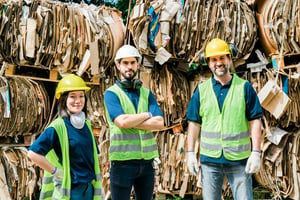
How are they structured?
Each sector group has a steering committee who guide the work programme. Members of the steering committee represent the sector and are elected to the committee by their peers.
The sector groups are mostly formed to meet specific goals, such as shaping policy, developing industry standards and good practice guidance, developing training and development processes, along with conducting research and development.
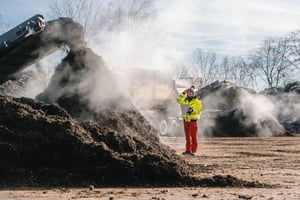

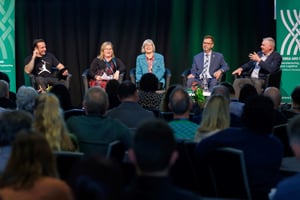


.webp?width=300&name=Fiona%20(1).webp)

